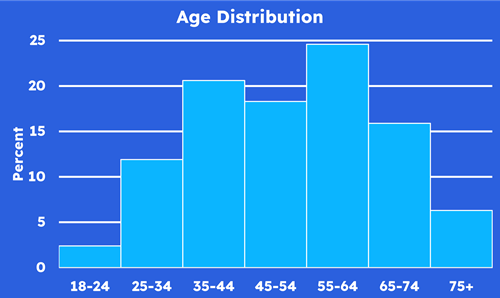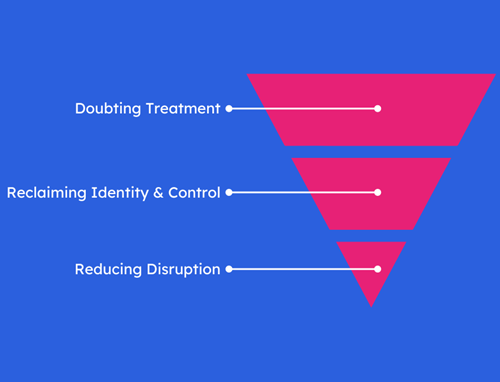Global Oncology Patient Nonadherence Study: An Overview
Evidence for Change Series: Oncology in Focus
Despite ongoing advances in cancer treatments, medication nonadherence remains a significant challenge among people living with cancer. Cancer treatments have increasingly shifted to home administration and this growth in “at-home” self-administered oral treatments is expected to continue. While at-home treatments are often cited as more convenient and preferred by patients, this change removes patients from traditional healthcare support structures and presents challenges for oncology care teams and patients in maintaining optimal adherence to therapy.

Evidence for Change Series: Oncology in Focus
Despite ongoing advances in cancer treatments, medication nonadherence remains a significant challenge among people living with cancer. Cancer treatments have increasingly shifted to home administration and this growth in “at-home” self-administered oral treatments is expected to continue. While at-home treatments are often cited as more convenient and preferred by patients, this change removes patients from traditional healthcare support structures and presents challenges for oncology care teams and patients in maintaining optimal adherence to therapy.
The Challenge
Rates of adherence to oral anti-cancer medicines can vary widely, between 16 and 100% (Foulon et al., 2011) and often worsen over time. Medication nonadherence is associated with poorer health outcomes, and increased healthcare utilisation and cost.
Effective interventions thus need to target both unintentional (e.g., forgetting, cost) and intentional (e.g., belief that medication is ineffective) reasons for nonadherence.
Study Objectives
Our goal was to deepen the understanding of intentional nonadherence to self-administered cancer treatments through utilising newly validated assessment tools.
Ultimately, we aim to contribute to enhanced adherence support strategies, improved health outcomes and brand/franchise value and differentiation by leveraging our findings.
Study Methodology
The Atlantis Health Behavioural Science team—headed by Global Lead Dr Kate Perry—used a cross-sectional, mixed methods design executed by a survey administered online. This study was approved by the Health and Disability Ethics Committee, Ministry of Health, New Zealand on 28 March 2024. Reference: 2024 EXP 19764.
Participants were recruited from a reputable global online panel commonly used in Behavioural Science research.
Eligible participants were aged 18+ years, residing in US, Europe, or Asia Pacific, with a cancer diagnosis and currently self-administering medication to treat it at home.
We asked a series of demographic and clinical questions to understand the nature of our sample. Key psychometrically-validated questionnaires were then administered, along with open-ended questions about participants' cancer and treatment experiences.
Data analysis involved the following:
Quantitative analysis
- Exploratory factor analysis to determine key reasons for nonadherence.
- Regression and correlation analyses to identify associations between nonadherence and other key variables, such as beliefs about medicines and illness perceptions.
- Comparison of our results with those from prior studies.
Qualitative analysis
- Inductive content synthesis for thematic analysis of cancer perceptions and experiences.
- Inductive content synthesis for thematic analysis of adherence motivations.
Study Sample Demographics
A total of 126 participants were eligible and completed the full survey.
The sample demographics were as follows:
- The age range was between 18 and 75+ years, with mean age between 45 and 54 years.
- 76% identified as female.
- Most of the sample resided in the UK (44%) and the US (40%), with 13% residing in Europe and 3% in Australia and New Zealand.
- Most participants were either currently living alone (25%) or with a partner/spouse (32%).

Study Sample Clinical Characteristics
We asked participants about their cancer diagnosis, how they administered their at-home medication, and how often.
The sample clinical characteristics were as follows:
- Participants' cancer diagnoses represented 12 main cancer types, including breast, thyroid, blood, male urologic, among others.
- Most participants were taking an oral anti-cancer treatment (97%).
- Most participants were taking their anti-cancer treatment once daily (87%).

Extent of Nonadherence & Intentional Reasons
56% of the sample reported at least some degree of nonadherence to their anti-cancer, at-home medication, which is comparable to levels found by the WHO and other published studies.
A key finding of the study revealed three main themes across several modifiable reasons for intentional nonadherence, each representing key areas for intervention:
- Doubting treatment
- Reclaiming identity and control
- Reducing disruption

Optimising Oncology Patient Support
Our findings reveal new and current insights into why people living with cancer might choose to not take their at-home anti-cancer medication as prescribed. They demonstrate the need to provide targeted and personalised patient support for those with cancer.
As part of oncology patient support programmes, interventions are required that specifically address the individual's key reasons for nonadherence. Optimising oncology patient support programmes this way will enable and empower those living with cancer to Change for Good
To learn more about how our findings can be leveraged in your patient engagement strategy, contact our Global Head of Behavioural Science and Lead Researcher—Dr Kate Perry—for a 30-minute online discussion: Click Here to contact Kate and request a meeting and receive a free copy of our study report.
Read about our expertise and more behavioural science insights.
